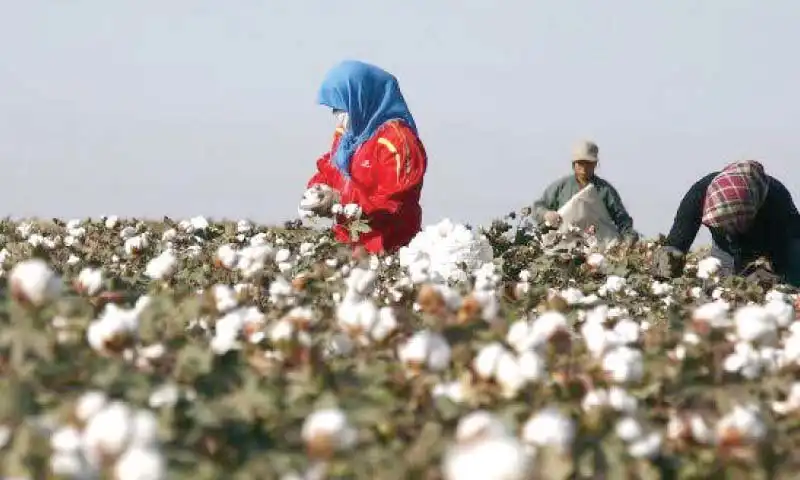- Web
- Feb 05, 2026
Cotton production hit by govt’s Export Facilitation Scheme
-

- Syed Raza Hassan
- May 19, 2025

KARACHI: Cotton production in Pakistan has become a casualty of the government’s Export Facilitation Scheme (EFS), with dozens of spinning and ginning units shutting down over the past two years as local production becomes increasingly unviable, market sources said.
Under the EFS, import of cotton, cotton yarn, and grey cloth is tax-free, while local cotton and its products are subject to an 18% sales tax — a policy that, according to Cotton Ginners Forum Chairman Ishan ul Haq, places domestic producers at a severe disadvantage, making Pakistan possibly the only country offering such tax relaxations on cotton imports.
He told Hum News English that the government’s EFS is supposed to ease and expedite the process of exporting goods. The scheme includes incentives like duty-free raw material imports, simple procedures and smooth regulatory compliance.
According to the government’s stance, the EFS is aimed at boosting exports, but Cotton Ginners Forum Chairman said the facility — available for the past two to three years to registered exporters — is being exploited, undermining local industry instead of supporting it.
Earlier, international prices used to be higher and local cotton was cheap and there was not much of an import trend of cotton.

This year for the first time in history, Pakistan has become the biggest importer of American cotton with about 20 million bales of imports in fiscal year 2025.
“As a result of import relaxation, our ginning sector is at the verge of closure,” Haq said, adding that a huge quantity of cotton yarn is being imported from China, instead of value addition to export it, they sell it in the local industry due huge difference of 18%.
“In my opinion this is all part of the planning of the sugar lobby in our country,” Cotton Ginners Forum Chairman said.
Earlier, he added, all cotton zones were converted into sugarcane zones, while new sugar mills were set up illegally. “Our bodies have met with the all top government functionaries and ministries in recent days but, to no avail.”
Pakistan stocks range-bound as i
Ihsan ul Haq went on to add that “this year, it was the second lowest cotton production of 5.5 million bales in the country’s history and even this low production is still not fully sold; 2.5 million bales are still lying in the factories unsold.”
He said that Pakistan’s lowest-ever cotton production was in FY2023 with 4.9 million bales. On the other hand, he added, textile mills that had purchased cotton on the condition of making payments within 15 days or a month are not honouring their commitments, leaving billions of rupees stalled.
Above 1000 units, factories closed
The chairman informed that over the last two years, nearly 150 spinning units and over 800 ginning factories have wrapped up their businesses.
Cotton cultivation is decreasing day by day in Pakistan, he said, adding that grower doesn’t get the fair price while ginning factories are facing so many taxes, estimated to be over 62%.
Haq believed that cotton production has never been an issue in Pakistan, but its consumption has always remained a major challenge. “There are no buyers for local cotton because imported cotton, exempted from the 18% sales tax, is proving to be cheaper, while locally produced cotton carries the additional tax burden, he explained.
Lesser cotton cultivation
Cotton cultivation is rapidly declining as farmers increasingly shit to sugarcane and maize, the chairman said while expressing concerns that the country already facing water shortage while sugarcane consumes a lot of water.
Moreover, he warned, due to lesser cultivation of cotton, “we would be importing more edible oil which is a bi-product of cotton seed”.

He blamed government’s adverse policies for the poor situation of cotton. “Nowhere in the world, cotton has such huge taxation.”
Pakistan Cotton Ginners Association Chairman Dr Jasso Mal also conveyed similar concerns, saying that “if these tax-free import of cotton continues, cotton production in Pakistan would have no future.”
He said that earlier, only cotton was imported, not yarn and cloth, but now both are being imported which has caused the local spinning mills closure. “Farmers will naturally switch to maize, rice, or sugarcane when they can’t even recover their costs.”
He added that cotton acreage has halved in the last decade — from 7.5 million acres to just 3.75 million — with Punjab’s Vehari district, once a top cotton producer, now almost barren of the crop.
IMF sets stringent pre-budget conditions for Pakistan
In Punjab alone, Dr Mal said, cotton area has shrunk from 6 million to 3 million acres, while Sindh has seen a reduction from around 1.6 million acres to about 1.3 million.
Of total cotton land in Punjab, sugarcane has overtaken 10 to 12 per cent, while another 22 per cent has shifted to maize and rice, both of which benefit from lower production costs due to minimal taxation, he added.




